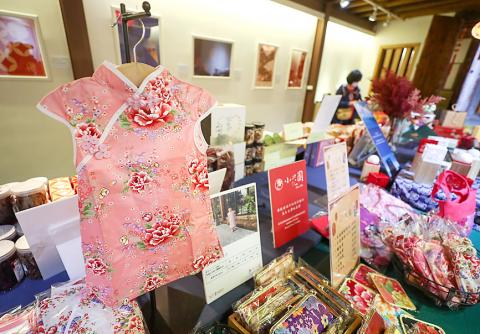The Hakka Affairs Council yesterday said that it is bringing Hakka products to Taipei’s Dihua Street (迪化) market and other locations ahead of the Lunar New Year holiday.
Taipei’s Dihua Street market “is the most important place for nianhuo [年貨, New Year’s goods] in Taiwan,” Hakka Affairs Council Minister Lee Yung-de (李永得) told a news conference in Taipei.
However, Hakka culture has been “absent” from the nianhuo shopping scene at the market, he said.

Photo: CNA
By introducing Hakka products to the Dihua Street market, the council hopes that the city residents’ higher spending power would drive the development of products from remote Hakka communities, he said.
The council aims to show people that Hakka industries include more than the caibao (菜包, vegetable buns) and huabu (花布, floral cloth) they are familiar with, he said.
As part of the initiative, starting Thursday, Hakka products, including food and other items, are to be sold at locations in Taipei and New Taipei City, the council said.
They include the Dihua Street market in Taipei’s Dadaocheng (大稻埕) area, the Taipei Bus Station and the social housing complex in the Fujhou (浮洲) area of New Taipei City’s Banciao District (板橋), it said, adding that the products would also be available online.
The first day of the Lunar New Year — the Year of the Rat — falls on Jan. 25 this year.

‘DENIAL DEFENSE’: The US would increase its military presence with uncrewed ships, and submarines, while boosting defense in the Indo-Pacific, a Pete Hegseth memo said The US is reorienting its military strategy to focus primarily on deterring a potential Chinese invasion of Taiwan, a memo signed by US Secretary of Defense Pete Hegseth showed. The memo also called on Taiwan to increase its defense spending. The document, known as the “Interim National Defense Strategic Guidance,” was distributed this month and detailed the national defense plans of US President Donald Trump’s administration, an article in the Washington Post said on Saturday. It outlines how the US can prepare for a potential war with China and defend itself from threats in the “near abroad,” including Greenland and the Panama

A magnitude 4.9 earthquake struck off Tainan at 11:47am today, the Central Weather Administration (CWA) said. The hypocenter was 32.3km northeast of Tainan City Hall at a depth of 7.3km, CWA data showed. The intensity of the quake, which gauges the actual effect of a seismic event, measured 4 in Tainan and Chiayi County on Taiwan's seven-tier intensity scale, the data showed. The quake had an intensity of 3 in Chiayi City and County, and Yunlin County, while it was measured as 2 in Kaohsiung, Nantou County, Changhua County, Taitung County and offshore Penghu County, the data showed. There were no immediate reports of

The Chinese Nationalist Party (KMT) is maintaining close ties with Beijing, the Democratic Progressive Party (DPP) said yesterday, hours after a new round of Chinese military drills in the Taiwan Strait began. Political parties in a democracy have a responsibility to be loyal to the nation and defend its sovereignty, DPP spokesman Justin Wu (吳崢) told a news conference in Taipei. His comments came hours after Beijing announced via Chinese state media that the Chinese People’s Liberation Army’s Eastern Theater Command was holding large-scale drills simulating a multi-pronged attack on Taiwan. Contrary to the KMT’s claims that it is staunchly anti-communist, KMT Deputy

RESPONSE: The government would investigate incidents of Taiwanese entertainers in China promoting CCP propaganda online in contravention of the law, the source said Taiwanese entertainers living in China who are found to have contravened cross-strait regulations or collaborated with the Chinese Communist Party (CCP) could be subject to fines, a source said on Sunday. Several Taiwanese entertainers have posted on the social media platform Sina Weibo saying that Taiwan “must be returned” to China, and sharing news articles from Chinese state media. In response, the Mainland Affairs Council (MAC) has asked the Ministry of Culture to investigate whether the entertainers had contravened any laws, and asked for them to be questioned upon their return to Taiwan, an official familiar with the matter said. To curb repeated